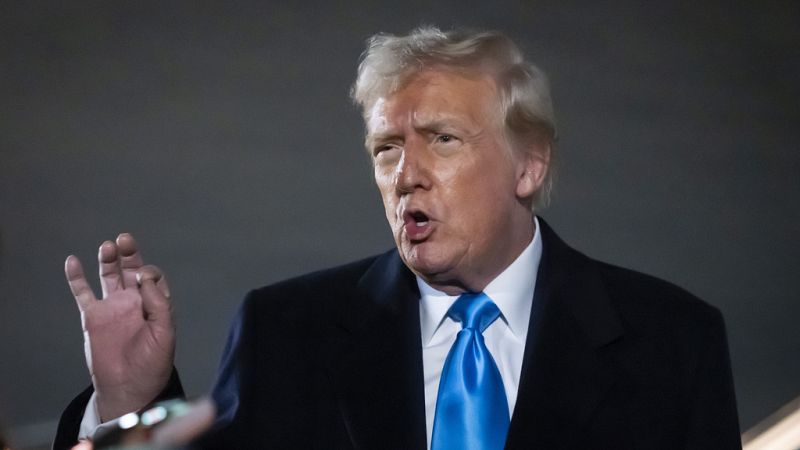Foreign aid cuts: implications for Africa under Trump's leadership

Many Africans were aware that Trump's "America First" policy suggested their continent would be low on his list of priorities.
However, they did not anticipate the sudden suspension of foreign aid from the largest donor in the world, which halted funding for various initiatives such as disease control, girls' education, and free school meals.
Despite some exceptions being made in response to global backlash, sub-Saharan Africa may experience the most significant impact as most international aid is paused for 90 days for a spending review.
Last year, the U.S. provided over $6.5 billion in humanitarian aid to the region.
For many in Africa, attention quickly shifted to the President’s Emergency Plan for AIDS Relief, known as PEPFAR, which is often regarded as the most effective foreign aid initiative globally.
Over the past twenty years, this program, which has enjoyed bipartisan support, has been credited with saving more than 25 million lives, primarily in Africa, the continent it was intended to benefit the most.
“The world is perplexed,” stated South Africa's health minister, whose country has the highest number of people living with HIV, following the U.S. aid freeze.
Pontsho Pilane, an activist and author, asserts that the issue at hand revolves around the rights of marginalized individuals.
She believes there is potential for a reevaluation of U.S. international interests, but fundamentally, this is driven by an anti-rights agenda.
It is not primarily concerned with the economic independence of nations like South Africa and other African countries.
Minister Aaron Motsoaledi noted that the U.S. contributes nearly 20% of South Africa’s $2.3 billion annual HIV/AIDS program through PEPFAR, putting the largest response to a single disease in jeopardy.
In South Africa, over 8 million individuals are living with HIV, and officials report that PEPFAR provides essential antiretroviral treatment to 5.5 million people daily.
U.S. Secretary of State Marco Rubio has declared that programs providing “life-saving” assistance, including medications, medical services, food, and shelter, would be exempt from the aid freeze, although the criteria for what qualifies remain unclear.
The United Nations AIDS program indicated that many organizations reliant on PEPFAR funding have shut down due to the aid suspension, leading to “lack of clarity and great uncertainty about the future.”
According to UNAIDS, over 20 million people worldwide receive HIV treatment supported by PEPFAR.
In Johannesburg, South Africa's largest city, and other locations, facilities funded by PEPFAR remained closed days after the exemptions were announced, forcing HIV patients to seek care at government hospitals and clinics.
In Soweto, Johannesburg's largest township, two employees at the PEPFAR-supported HIVSA center turned away patients. A notice at the well-known Wits RHI Key Populations Clinic, which caters to adults and children living with HIV, stated: “We apologize for the inconvenience this causes.”
Experts are uncertain about the impact on HIV programs, but they warn that the repercussions could be immediate and severe.
Even high-ranking officials within the aid community are unclear about which U.S.-funded programs can continue operations, even temporarily.
Gethrude Tukura, a digital marketing professional, backs former President Uhuru Kenyatta's warning to African leaders regarding an overdependence on foreign aid.
She stated, "The aid he reduced for Africa aligns with Uhuru Kenyatta's message. I believe it's a crucial reminder for African leaders to improve and not depend exclusively on international assistance."
The Trump administration has cautioned USAID contractors and staff that they may face disciplinary action for communicating with anyone outside the agency without top-level approval, leading aid organizations to worry about potentially losing funding if they speak out.
A humanitarian official informed The Associated Press that at least 1.2 million individuals in Congo could lose critical support due to the aid freeze.
This official, who requested anonymity due to lack of authorization to speak publicly, noted that nearly half of their organization’s funding comes from USAID.
In total, over $100 million for humanitarian programs across more than 30 countries has been suspended, according to the official.
This aid blockage coincided with a significant escalation in conflict in eastern Congo, where millions were already displaced and outbreaks of the mpox virus were declared a global health emergency last year.
Despite the exemption for life-saving services, the official indicated that their organization had been instructed not to resume any USAID-funded activities until they receive confirmation that the waiver applies to them.
Today

